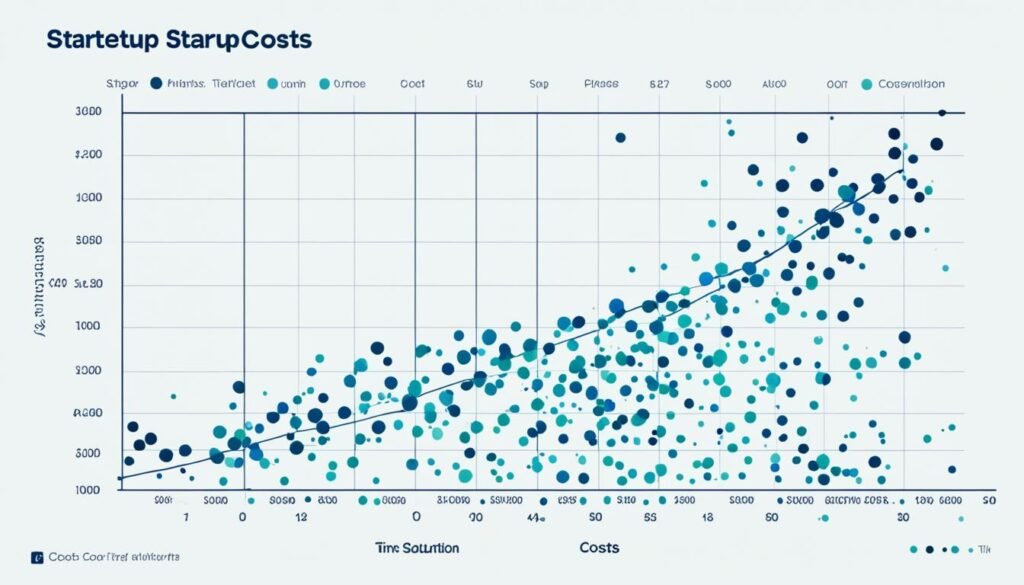Starting a business is thrilling but also tough. It’s crucial to plan your finances well. Figuring out your startup costs is a key step. It can mean the difference between success and failure.
Many new business owners underestimate their expenses. They hope for a quick surge in customers to cover costs. But this can lead to cash flow problems for new businesses.
Good budgeting and cost planning are essential. They help manage your startup costs and set your business up for growth. Knowing your startup costs helps with planning, funding, and pricing. This makes your business more likely to succeed in the long run.
Table of Contents
Understanding the Importance of Startup Cost Estimation
Estimating your startup costs accurately is vital for your business’s success. It helps you write a strong business plan, get the right funding, and plan for growth. Knowing what you need to start your business is key.
Why it Matters for Business Planning and Funding
Knowing your startup cost estimation is crucial for new founders. These costs include things like market research and writing your business plan before you start. After starting, you’ll have expenses like marketing, paying employees, and keeping your business running.
By predicting these costs well, you lay a strong financial base for your business. This makes it easier to get funding from investors or lenders. It also helps with smooth operations in the early stages.
| Startup Cost Category | Example Expenses |
|---|---|
| Cost of Sales | Inventory, raw materials, production costs |
| Professional Fees | Legal, accounting, consulting fees |
| Technology Costs | Website development, software subscriptions, IT infrastructure |
| Administrative Costs | Office rent, utilities, insurance, licenses and permits |
| Sales and Marketing | Advertising, promotions, branding, networking events |
| Wages and Benefits | Salaries, payroll taxes, health insurance, retirement plans |
By keeping an eye on these startup cost estimation areas, you make sure your business has enough money to succeed. Good planning and financial planning help you get funding. They also guide you towards sustainable growth and profits.

Key Startup Cost Categories
Starting a new business means understanding the different costs you’ll face. These costs fall into two main groups: one-time and ongoing expenses.
One-Time Startup Costs
One-time costs happen only once, at the start of your business. They include:
- Business registration and licensing fees
- Professional services (legal, accounting, consulting)
- Website design and development
- Branding and marketing materials (e.g., business cards, logo design)
- Initial inventory or equipment purchases
- Office furniture and decorations
Ongoing Startup Costs
Ongoing costs are what you’ll pay regularly to keep your business going. These are:
- Rent or lease payments for your business premises
- Utility bills (electricity, water, internet, etc.)
- Payroll and employee-related expenses
- Ongoing marketing and advertising activities
- Insurance premiums
- Office supplies and equipment maintenance
- Professional development and training
- Travel and transportation costs
Knowing about startup cost categories is key for budgeting and planning. By understanding both one-time and ongoing costs, you can make sure your business has enough money to start and stay strong.
| Startup Cost Category | Estimated Range |
|---|---|
| Incorporation and Licensing Fees | Under $300 |
| Equipment Costs | $10,000 to $125,000 |
| Office or Retail Space | $100 to $1,000 per employee per month |
| Inventory | 17% to 25% of total budget |
| Marketing | Below 10% of total budget |
| Website Building | Around $40 per month |
| Office Furniture and Supplies | Approximately 10% of total budget |
| Utilities | Around $2.10 per square foot |
| Payroll | 25% to 50% of total budget |
| Professional Consultants | $1,000 to $5,000 per year |

“Accurately estimating both one-time and ongoing expenses is crucial for ensuring your business has the necessary funding to get off the ground and remain sustainable in the long run.”
Startup Cost Estimation for Specific Business Types
The type of business you plan to start greatly affects your startup costs. Costs differ between brick-and-mortar, online, and service-based businesses. It’s key to know these differences to plan your initial investment well.
Brick-and-Mortar Businesses
Brick-and-mortar businesses usually cost more to start than online or service-based ones. You’ll need to pay for a physical location, inventory, equipment, and more. The Small Business Administration says these costs can be from $10,000 to $50,000 or more. This depends on the industry and what your business needs.
Online Businesses
Online businesses, on the other hand, need less money to start. You don’t need a physical space or a lot of inventory. The average startup costs for an online business are usually between $2,000 and $5,000. This covers website development, digital marketing, and small inventory.
Service-Based Businesses
Starting a service-based business can be cheaper, but costs vary by service. These businesses often need less inventory and space. But, they might still have to buy equipment, software, and get professional certifications or licenses. The average startup costs for a service-based business can be from $5,000 to $20,000. This depends on the industry and the services offered.
| Business Type | Typical Startup Costs |
|---|---|
| Brick-and-Mortar | $10,000 to $50,000+ |
| Online | $2,000 to $5,000 |
| Service-Based | $5,000 to $20,000 |
Getting your startup costs right is key for good planning, making smart decisions, and getting the funding you need. This helps you launch your business successfully.

Startup Cost Estimation
Figuring out your startup costs is key to starting a successful business. Start by listing all the expenses you’ll have, like office space, equipment, licenses, salaries, and marketing. Do your homework by looking up online and talking to experts or similar businesses.
Put these costs into one-time and monthly groups. Then, add them up to see how much money you’ll need. Don’t forget to think about what assets you have, like cash, equipment, and inventory. Use this info to figure out when your business will make money.
Knowing your startup costs helps you get funding from investors or lenders. It also makes starting your business smoother. Here are some important points to remember:
- Average Startup Costs by Industry: Health Care ($10,000 – $50,000), Construction ($10,000 – $50,000), Consulting ($2,000 – $10,000), Retail ($30,000 – $50,000), Creative Services ($5,000 – $15,000), Technology ($5,000 – $30,000), Manufacturing ($50,000 – $150,000), Food Service ($50,000 – $250,000)
- Startup Cost Categories: Office Space, Equipment and Office Supplies, Rent and Utilities, Permits and Licensing, Business Insurance, Legal/Accounting/Consultant Fees, Product and Inventory, Employee Costs, Marketing and Market Research, Domain Acquisition
- Tips to Save Money: Negotiate Prices, Stay Within Budget, Control Spending, Monitor Travel Expenses, Apply for Grants, Utilize Free Tools, Leverage Social Media for Marketing, Use Tax Write-Offs
- Tax Write-Offs: Home Office Expenses, Business Equipment and Supplies, Legal and Accounting Fees, Travel Expenses, Marketing Expenses
Ramp’s tools can help you figure out your startup costs and manage your money. They also help you estimate revenue, make a business plan, and attract investors. By planning your startup costs well, you can set your business up for success.
| Startup Cost Category | Estimated Cost |
|---|---|
| Office Space | $2,000 – $5,000 per month |
| Equipment and Supplies | $5,000 – $20,000 |
| Permits and Licensing | $500 – $5,000 |
| Business Insurance | $1,000 – $5,000 per year |
| Legal and Accounting Fees | $2,000 – $10,000 |
| Product and Inventory | $10,000 – $50,000 |
| Employee Costs | $20,000 – $100,000 per year |
| Marketing and Advertising | $5,000 – $20,000 |

Conclusion
Knowing your startup costs is key to your new business’s success. It’s important to list both one-time and ongoing expenses. This helps you make a detailed financial plan for starting and growing your business.
Getting your startup costs right is vital for getting funding and planning for the future. It’s a big step in making your business dreams come true. So, take the time to research and figure out these costs well.
Good cost estimation helps you plan how to finance your business. It lets you manage your money better and make smart choices. This way, you can grow your business in the long run.
Putting in the effort to understand and estimate your startup costs is a smart move. It lays the groundwork for a financially healthy business. By doing this, you set yourself up for success and reach your business goals.




4 Comments on “Estimating Startup Costs: What You Need to Know Before Launching 2024”